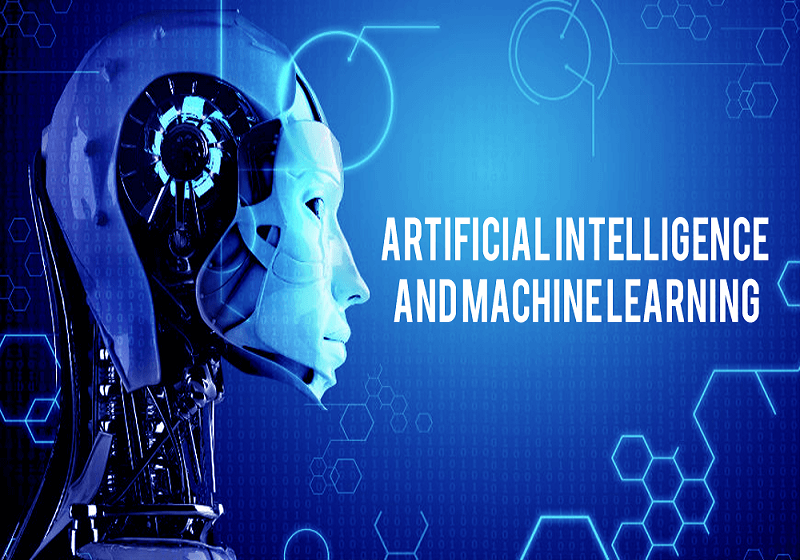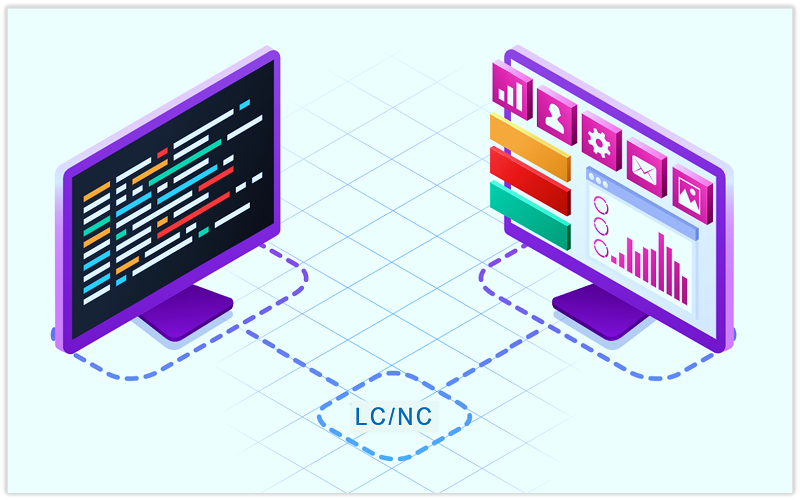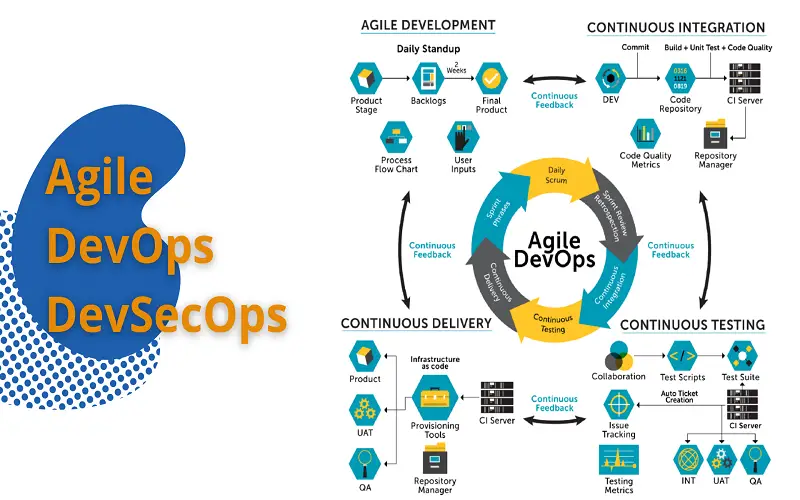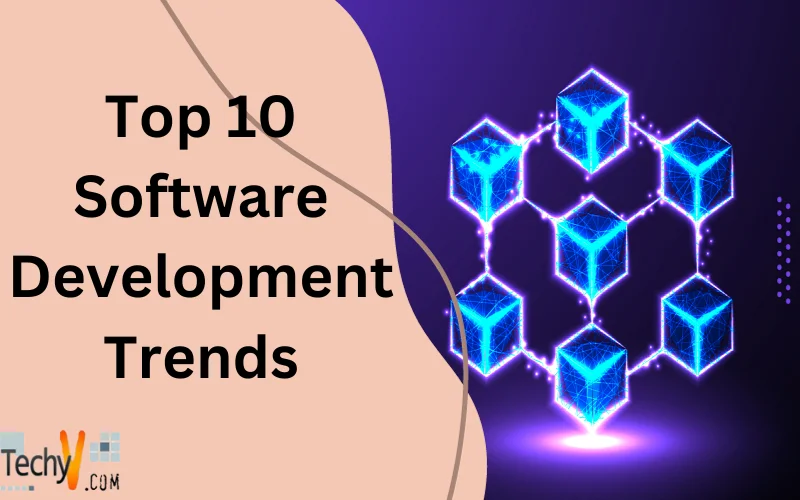The field of software development is in a constant state of evolution, driven by technological advancements and evolving user demands. In this rapidly changing landscape, developers and organizations must keep up with the latest trends. This compilation presents the top 10 software development trends profoundly shaping the industry. These trends include a broad spectrum, from the increasing integration of artificial intelligence and machine learning to the emergence of server-less computing and blockchain technology. They are not only impacting the way software is created and deployed but also revolutionizing the fundamentals of digital innovation. Embracing these trends is essential to maintaining competitiveness and ensuring the continued relevance and effectiveness of software solutions in a dynamic and ever-changing digital environment.
1. Artificial Intelligence And Machine Learning
Artificial Intelligence (AI) and Machine Learning (ML) have revolutionized software development by enabling the learning and optimization of applications. This trend is profoundly shaping the industry, as software solutions become more innovative and better able to handle complex tasks. AI and ML allow developers to build applications that can analyze data, make predictions, and automate processes. These technologies have found application in various fields, such as healthcare, finance, and e-commerce. By leveraging AI and ML, organizations can improve efficiency, enhance user experience and drive innovation. Embracing this trend is critical for developers and organizations to stay competitive and meet the ever-evolving demands of users in a rapidly changing digital landscape.

2. Internet Of Things (IoT)
Experiencing exponential growth in the Internet of Things (IoT), creating a vast network of interconnected devices that facilitate effortless communication and data sharing. This ever-expanding ecosystem includes a wide array of smart devices, from everyday household items like thermostats and refrigerators to industrial machines and health Services and appliances are IoT technology has revolutionized how businesses operate and how individuals interact with their surroundings. It offers unparalleled convenience through remote control and monitoring, real-time data analysis, and predictive maintenance. As IoT continues to evolve, with transformative capabilities opening new possibilities in industries, from optimizing supply chains and energy management to enhancing healthcare services and urban infrastructure, IoT is poised to reshape our world, making it more efficient, interconnected, and data-driven than ever before.

3. Low-Code And No-Code Development
Low-code and no-code platforms have revolutionized the software development landscape by allowing developers to build applications quickly and effectively, all while reducing the need for extensive code. Now, you can focus on designing user experiences, logic, and integration rather than diving into complex code details. This not only accelerates the development cycle but also empowers a broader range of professionals without extensive coding backgrounds to actively contribute to application creation. In essence, low-code platforms have democratized app development, fostering innovation in today’s fast-paced digital landscape, and streamlined the process.

4. DevOps And Agile Practices
DevOps and Agile methodologies represent two powerful approaches that synergize to drive collaboration, efficiency, and a culture of continuous delivery in software development. Agile practices featuring iterative development, customer feedback, and flexibility helped teams respond quickly to changing needs. Fostering seamless communication and automation Combining Agile’s adaptive principles with DevOps’ focus on automation and collaboration, organizations get faster development cycles, faster deployments, and more robust, reliable software. This harmonious blend enables teams not only to meet and exceed customer expectations and maintain a competitive edge in a dynamic world.

5. Cloud Computing
Cloud computing remains a transformative force in the world of technology, offering developers a dynamic, scalable ecosystem to build, host, and manage applications with remarkable ease. This paradigm shift in computing leverages remote servers to deliver infrastructure, storage, and a diverse range of services. They are flexible in the cloud. The architecture allows developers to effortlessly scale up or down resources to meet evolving demands and optimize performance and cost-effectiveness. Moreover, cloud computing fosters collaboration, accelerates development cycles, ensures applications are accessible anywhere, and revolutionizes how software is designed and delivered in our digital age. It has become a cornerstone of modern application development, empowering developers to innovate and deploy with unparalleled efficiency and agility.

6. Cybersecurity
In an era marked by the rise of cyber threats, the imperative for robust cybersecurity measures has never been greater. Protecting software integrity and user data is paramount to ensuring trust and reliability in the digital realm. As technology advances, cyberattacks increase in sophistication and scale, making security an imperative priority for software developers and organizations. Implementing rigorous security protocols, regular vulnerability assessments, and integrating cybersecurity into the development process through practices like DevSecOps are critical to strengthening defenses. Data breaches and cyberattacks are increasingly costly and damaging.

7. Blockchain Technology
Blockchain technology presents a powerful solution for secure and transparent data transactions, making it highly valuable in applications where trust and decentralized systems are essential. Blockchain ensures data immutability by design, making it resistant to tampering and fraud. It acts as a distributed ledger, recording transactions across a network of nodes, increasing transparency, and reducing the risk of manipulation. The technology finds applications in various of industries, from finance and supply chain management to healthcare voting systems. Provides As the need for secure and transparent data capture grows, blockchain stands as a revolutionary force, reshaping the way businesses and organizations approach data transactions and fostering a new era of trust and decentralization.

8. Progressive Web Apps (PWA)
Progressive Web Apps (PWAs) represent a harmonious fusion of the most beneficial qualities of web and mobile apps, culminating in an exceptional user experience characterized by speed and interactivity. Works seamlessly PWAs have earned praise for their ability to load instantly, even in challenging network conditions, and for their offline functionality. Furthermore, they avoid installing an app, enabling users to access their favorite services and content with minimal friction. Embracing the best of both digital worlds, PWAs stand as a testament to the ongoing evolution of software development, enriching the user experience, and simplifying accessibility.

9. Augmented Reality (AR) And Virtual Reality (VR)
The transformative power of augmented reality (AR) and virtual reality (VR) technologies is reshaping industries across the board, ushering in a new era of immersive and interactive experiences. These technologies are bridging the gap between the physical and digital worlds, providing limitless possibilities in gaming, education, healthcare, and beyond. VR in gaming is one of the most essential tools in the world. In education, AR and VR facilitate immersive learning experiences, making complex subjects more accessible. In healthcare, surgeons can practice procedures in VR, and patients can benefit from medical VR applications. As these technologies continue to evolve and become more accessible, their impact on industries will only deepen, opening doors to innovative solutions and unprecedented paths of engagement.

10. Quantum Computing
Quantum computing stands on the precipice of revolutionizing software development in various fields with an unparalleled ability to tackle complex problems, long remaining inaccessible to classical computers. As quantum computing technology matures and software developers seek new algorithmic applications that promise to unlock new frontiers of efficiency and innovation still in their infancy, the transformative power of quantum computing is poised to reshape the software development landscape, promising solutions to hitherto insurmountable challenges. It also opens the door to unprecedented possibilities in the digital realm.



















